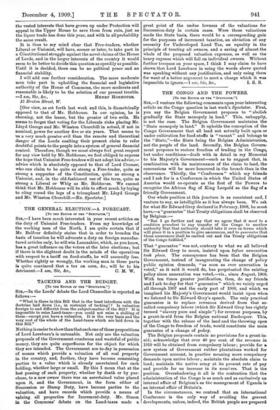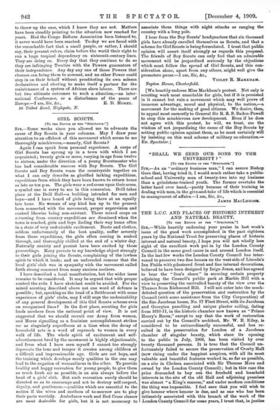THE CONGO AND THE POWERS.
[To THE EDITOR OP THE " SPECTATOR1
Sra,—I venture the following comments upon your interesting article on the Congo question in last week's Spectator. First, you say the Belgian Government proposes to " abolish
gradually the State monopoly in land." This, unhappily, is not the case. The Belgian Government maintains the "State monopoly in land." It upholds the conception of the Congo Government that all land not actually built upon or under cultivation for food-stuffs is " vacant " and belongs to
the " State,"—the State being the Belgian Administration, not the people of the land. Secondly, the Belgian Govern- ment proposes to restore freedom of trading in the Congo, but under conditions—dealt with in detail in my Memorial to his Majesty's Government—such as to suggest that, in combination with its maintenance of the claim to land, the concessions will be more honoured in the breach than in the observance. Thirdly, the " Conference " which my friends and I ask for is a Conference in which the United States of America would co-operate as the first of the Powers to
recognise the African flag of King Leopold as the flag of a friendly Government.
Our whole position at this juncture is as consistent and, I venture to say, as intelligible as it has always been. We ask for what Sir Edward Grey declared in February, 1908, he must
have,—a "guarantee" that Treaty obligations shall be observed by Belgium:— "But I go further and say that we agree that it must be a condition precedent to any transfer of the Congo to another authority that that authority should take it over on terms which will place it in a position to give assurances, and to guarantee that those assurances shall be carried out and the Treaty obligations of the Congo fulfilled."
That " guarantee " was not, contrary to what we all believed Sir Edward Grey to mean, insisted upon before annexation took place. The consequence has been that the Belgian Government, instead of inaugurating the change of policy public opinion demands, "as soon as ever annexation is voted," as it said it would do, has perpetuated the existing policy since annexation was voted,—viz., since August, 1908.
With ten times greater justification, then, do my friends and I ask to-day for that " guarantee " which we vainly urged all through 1907 and the early part of 1908, and which we imagined his Majesty's Government would insist upon when we listened to Sir Edward Grey's speech. The only practical guarantee is to replace revenues derived from that so- called compulsory labour (which Sir Edward Grey has rightly termed "slavery pure and simple ") for revenue purposes, by a grant-in-aid from the Belgian national Exchequer. This, together with the release of the land and the throwing open of the Congo to freedom of trade, would constitute the main guarantee of a change of policy.
The Belgian proposals contain no provisions for a grant-in- aid; acknowledge that over 40 per cent. of the revenue in 1910 will be obtained from compulsory labour; provide for a new system of Government rubber plantations worked for Government account, in practice meaning more compulsory demands upon native labour ; maintain the absolute claim to land; maintain the native army at its present rate of pay and provide for an increase in its numbers. That is the position. Overshadowing it all is the contention that the
administration of the Congo is as much and as exclusively an internal affair of Belgium's as the management of Uganda is an internal affair of Britain's.
In the circumstances, we contend that an international Conference is the only way of avoiding the gravest developments, unless, indeed, the British people are prepared to throw up the case, which I know they are not. Matters have been steadily pointing to the situation now reached for years. Had the Congo Reform Association been listened to, it never would have been reached. To-day we are faced with the remarkable fact that a small people, or rather, I should say, their present rulers, claim before the world their right to run a hpge tropical dependency on sixteenth-century lines. They are doing so. Every day that they continue to do so they are infringing Treaties with the Powers guarantors of their independence. Any day any one of those Powers that chooses can bring them to account, and no other Power could step in on their behalf without prostituting its own solemn declarations and electing to make itself a partner for the maintenance of a system of African slave labour. There are but two ultimate outcomes to such a situation,—an inter- national Conference, or a disturbance of the peace of
Europe.—I am, Sir, &c., E. D. MOREL. 96 Talbot Road, Highgate, N.







































































 Previous page
Previous page